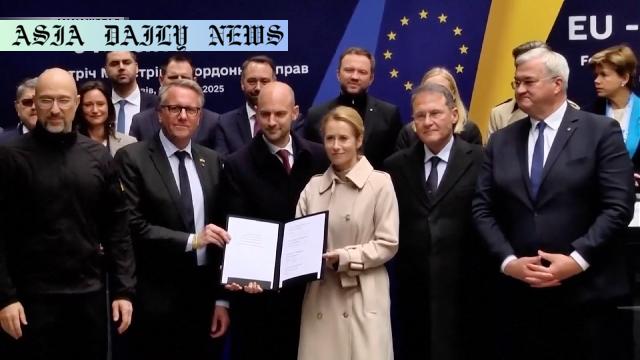Tribunal: Europe eyes a special tribunal to hold Russian leaders accountable for the crime of aggression in Ukraine.
- Key Point 1: Europe plans a tribunal under the Council of Europe to hold Russia accountable for aggression in Ukraine.
- Key Point 2: International prosecution challenges exist for leadership roles, including Vladimir Putin.
- Key Point 3: Europe focuses on accountability to prevent future occurrences of similar crimes.

Europe’s Push for Justice: Establishing Accountability for Russian Aggression
In a significant move towards promoting global accountability, Europe is taking bold steps to address the ongoing conflict in Ukraine. Leaders across the continent are paving the way towards the creation of a special tribunal to prosecute Russian government and military officials for their alleged crimes of aggression. This decision underscores Europe’s unwavering determination to ensure justice for Ukraine and deter future acts of aggression. Discussions regarding this tribunal took place during a high-profile meeting of European foreign ministers in Lviv, a poignant location given its proximity to the conflict.
The tribunal, likely to operate under the auspices of the Council of Europe, aims to circumvent the existing legal barriers posed by international law that currently protect sitting presidents and high-ranking leaders from prosecution. While this tribunal cannot directly target Russian President Vladimir Putin without a United Nations Security Council referral—a realistically challenging endeavor—it lays a foundation for collecting evidence and initiating groundwork necessary for future prosecutions. Such decisive action sends a strong signal about Europe’s commitment to justice, emphasizing that crimes of this magnitude cannot go unpunished.
Challenges and Limitations of Prosecuting Leaders
The legal complexities surrounding the prosecution of senior officials present a formidable challenge. According to international law, sitting leaders such as presidents enjoy certain immunities which make their prosecution incredibly difficult. One of the pivotal figures in this conflict, Russian President Vladimir Putin, is already under an International Criminal Court warrant on suspicion of war crimes. However, pursuing charges of aggression under similar frameworks would require unprecedented international cooperation. Such cooperation hinges on overcoming geopolitical hurdles, particularly the vetoes exercised by permanent United Nations Security Council members.
Despite these constraints, the tribunal represents Europe’s broader commitment to securing accountability. By focusing on gathering evidence and establishing the mechanics for prosecution, European leaders are setting the stage for a more comprehensive system that could eventually corner those responsible. The message is clear: aggression and war crimes, no matter the status of the individuals involved, are condemned and will be pursued to the fullest extent possible once opportunities arise.
Broader Implications for International Accountability
Europe’s initiative to form this special tribunal has significant implications for international law and the broader fight against impunity. By prioritizing justice for Ukraine, the continent is reiterating its role as a staunch defender of human rights and fairness in the global arena. The Council of Europe, which has long stood as a safeguard against human rights violations, provides an ideal platform for such an initiative. Additionally, this tribunal reinforces the notion that the global community must not stand idly by in the face of profound injustices such as those unfolding in Ukraine.
The tribunal also serves as a warning to other nations and leaders contemplating similar aggressive actions. Without accountability, as aptly stated by the EU’s foreign policy chief Kaja Kallas, such actions are bound to recur. The proactive measures Europe is taking might set a precedent for similar actions elsewhere, reinforcing international law as a potent and effective tool against aggression. This tribunal embodies not only justice for Ukraine but also reinforces global efforts in maintaining peace and demonstrating to perpetrators that consequences for their actions are inevitable.



Commentary
A Bold Legal Step by Europe
The decision by European leaders to propose a special tribunal marks a bold and necessary step in addressing one of the most significant geopolitical challenges of our time. Amid a backdrop of mounting atrocities and a humanitarian crisis in Ukraine, this initiative reinforces the belief that justice must not only serve as a tool for resolution but also as a deterrent for future conflicts. The deliberate choice to pursue this plan highlights the European Union’s commitment to preserving moral and ethical standards in global affairs.
Challenges and Perseverance
The establishment of such a tribunal is not without its hurdles. At a time when global cooperation is fractured by competing interests, particularly in forums like the United Nations Security Council, navigating legal and political frameworks to hold leaders accountable is intricate. The protections provided to sitting leaders by international law cannot be ignored, and the path to prosecuting high-ranking officials will require innovative thinking and collective determination. However, Europe’s focus on groundwork—such as collecting evidence—is a testament to the region’s unwillingness to back down against sophisticated legal and geopolitical barriers.
Setting Precedents for Global Accountability
Ultimately, the success of this tribunal has far-reaching implications that extend beyond Ukraine. If successfully implemented, it could pave the way for similar efforts to tackle crimes of aggression and violations of international law elsewhere. Europe’s leadership in this regard sets a powerful example, demonstrating how regional alliances can work in concert to uphold justice and human rights. This move is not just about addressing the current crisis but also about building trust in international legal mechanisms and reassuring victims of such crimes that their suffering will not be dismissed.